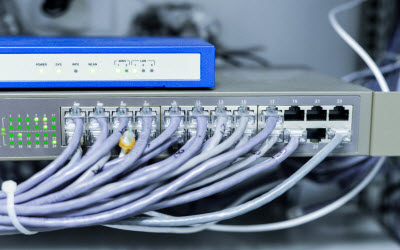Why Choose this Training Course?
Network Fundamentals is a foundational course designed to provide a comprehensive understanding of networking principles and technologies. Covering topics such as network architecture, protocols, topologies, and troubleshooting, this course equips learners with the knowledge and skills necessary to design, implement, and maintain both wired and wireless networks. Through a combination of theoretical concepts and hands-on practical exercises, students will learn how data is transmitted across networks, how devices communicate with each other, and how to configure and manage network devices. Whether you’re new to networking or seeking to enhance your skills, this course serves as an essential stepping stone towards a career in IT infrastructure and networking.
This training course will highlight the following:
- A Network Fundamentals course highlights the basics of networking, covering topics such as network protocols (TCP/IP, UDP), network devices (routers, switches), IP addressing, network topologies, security, wireless networking, troubleshooting, and network management. It provides essential knowledge for understanding how networks operate and is valuable for those pursuing careers in IT infrastructure and networking.
What are the Goals?
Upon attending this training course, the participants will be able to:
- Gain a solid understanding of fundamental networking concepts, including the OSI model, TCP/IP protocol suite, network devices, and network topologies.
- Learn about common networking devices such as routers, switches, hubs, and access points, and their roles in building and managing computer networks.
- Understand the role of network protocols and standards in communication between devices on a network, including Ethernet, IP, TCP, UDP, HTTP, and DNS.
- Develop skills in IP addressing and subnetting, including understanding IPv4 and IPv6 addressing schemes, subnet masks, and subnetting techniques.
- Explore routing and switching concepts, including how routers and switches forward packets between network segments and make routing decisions based on destination IP addresses.
- Learn about basic network security principles and techniques, including access control, authentication, encryption, firewalls, and intrusion detection systems (IDS).
- Understand the principles of wireless networking, including Wi-Fi standards, encryption methods, authentication mechanisms, and common wireless security threats.
- Develop skills in network troubleshooting and management, including diagnosing network connectivity issues, monitoring network performance, and managing network configurations.
- Explore common network services such as DHCP, DNS, NAT, VPN, and FTP, and their roles in providing network connectivity and services to users.
- Learn about network design principles and best practices, including designing network architectures, selecting appropriate network devices, and implementing network configurations.
Who is this Training Course for?
This training course is appropriate to the following:
- Beginners in IT: This course is ideal for individuals new to the field of IT who want to establish a solid understanding of networking principles as a foundation for further study or entry-level roles in the industry.
- Students: Whether you’re pursuing a degree in computer science, information technology, or a related field, this course provides essential knowledge that complements your academic studies and prepares you for future coursework or internships.
- IT Professionals: If you’re already working in IT but lack formal training in networking, this course offers an opportunity to fill in knowledge gaps, enhance your skills, and advance your career by obtaining a deeper understanding of network infrastructure.
- Career Changers: Individuals looking to transition into IT careers from unrelated fields will find this course invaluable for acquiring the fundamental knowledge needed to pursue roles in network administration, support, or cybersecurity.
- Small Business Owners and Entrepreneurs: For those managing their own businesses or startups, understanding network fundamentals is crucial for setting up and maintaining efficient and secure network infrastructure, even if you don’t have a technical background.
- Professionals Seeking Certification: If you’re preparing for industry-standard certifications such as CompTIA Network+, Cisco CCNA, or similar exams, this course serves as an excellent starting point to build the foundational knowledge required to pass these certifications.
How will this Training Course be Presented?
This Course is designed for computer teaching with the use of an Advanced Virtual Learning Platform in the comfort of any location of your choice. There will be an exercise, case studies, and real-life examples to help the participants use their knowledge to build their skills on each topic.
- Chapter 1, Introduction to Networking EssentialsProvides an overview of the fundamental concepts and terminology related to networking. This chapter is designed to give you a solid understanding of the basic principles and key elements of networking, making it the ideal starting point for anyone new to the subject.Chapter 2, Networking History and EvolutionExplores the history and evolution of networking, from the earliest days of computer networking to the modern-day global networks that we use today. This chapter will give you a better understanding of how networking has evolved over the years and how it has become an essential part of our lives.Chapter 3, Open Systems Interconnection (OSI) Reference Model
Introduces the Open Systems Interconnection (OSI) reference model, which is a conceptual framework that describes the various functions of computer networking. The OSI model is a crucial component of networking, and this chapter will provide you with an in-depth understanding of its purpose and significance.
Chapter 4, Introduction to Network Architecture and Design
Covers the basics of network architecture and design, including the various types of networks, topologies, and network protocols. This chapter is designed to help you understand the different aspects of network architecture and design, and how they contribute to the overall functioning of a network.
Chapter 5, Project Management
Covers the fundamentals of project management and provides tips and strategies for managing and organizing your network projects. This chapter will help you understand the key elements of project management and how to effectively plan, execute, and monitor your network projects.
Chapter 6, Specifications Writing
Covers the importance of writing clear and concise specifications for your network projects. This chapter will help you understand the importance of specifications in networking and how to write them in a way that effectively communicates your requirements and expectations.
Session 1: 11:00-12:30 Dubai [UTC/GMT +4]
Break : 12:30 – 13:00 Dubai [UTC/GMT +4]
Session 2: 13:00 – 14:30 Dubai [UTC/GMT +4]
Certificate of Completion for delegates who attend and complete the course
COURSE REGISTRATION
Kindly email info@emaratic.com for registration or call +971 43 34 6009 for assistance
WANT TO KNOW MORE
Our Training Platforms

Digital Learning

Virtual Learning

Instructor-Led Learning

Blended Learning


